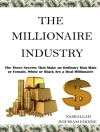To read this ’mini-book, ’ as well as our entire archive of writing on Category Design, subscribe to Category Pirates here:
categorypirates.substack.com
Most people don’t know that the man who built Zoom into the world’s most-used video conferencing platform, Eric Yuan, is a twinkly-eyed, happiness-obsessed, Asian American immigrant.
- In 1997, Eric came to Silicon Valley from China despite having his visa rejected eight times.
- He joined a startup called Web Ex as an engineer, which at the time had just a dozen employees. Web Ex was one of the first companies to introduce the world to video conferencing technology.
- 10 years later (2007), Web Ex was acquired by Cisco for $3.2 billion, where Eric became Cisco’s Corporate VP of Engineering. He was responsible for more than 750 engineers.
By every definition, Eric had reached what most people would consider the ’pinnacle of success.’ But the truth is, he wasn’t happy.
A few years later, Eric pitched the idea of Zoom to his team of executives.
Immediately, he was met with hesitation.
Well, as the story goes, Eric left Web Ex to build Zoom in 2011.
Was this just another classic example of an entrepreneur leaving a large company to pursue his or her dream? Maybe. But one has to wonder to what extent Eric’s experience is yet another data point in a longstanding pattern of talent mismanagement in corporate America rooted in bias, and an undervaluing of Asian American workers.
In this ’mini-book’ you will learn:
- Asianisms that exist in corporate America, and how major corporations are screwing over Asian people-and in doing so, screwing themselves.
- Why talented Asian Americans are choosing entrepreneurship and founding high-growth companies like Nvidia, Gusto, and Doordash.
- How Category Design can help you switch from ’operating from a binary bias’ to ’operating with a spectrum mindset.’
- A framework for Asian Americans to know their ’walkaway position’ for business negotiations.
- Why Category Design can spark social change and stop people from jumping to judgment.
Short, sweet, and jam-packed with incredibly valuable insights, this ’mini-book’ shares why talented Asian Americans are leaving white corporate America and creating more value elsewhere.












